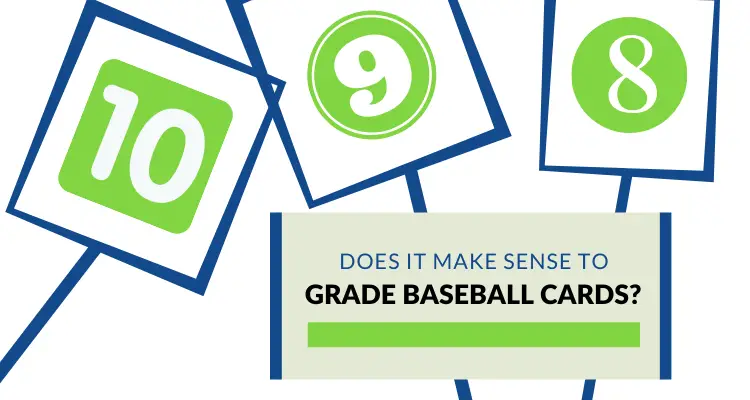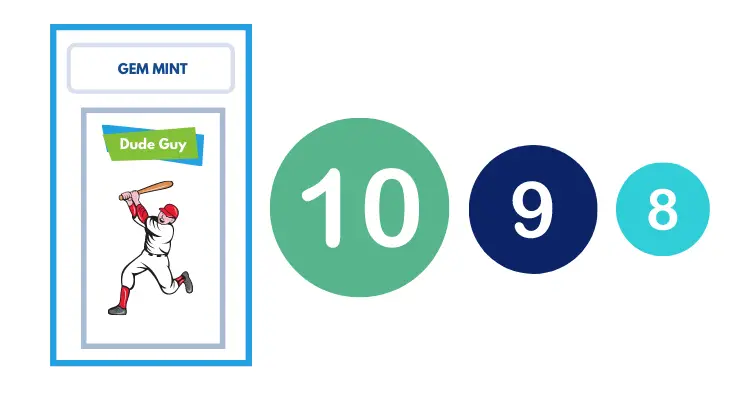 Ryan Barone (@ballcardgenius on TikTok, Card Expert) is a lifelong member of the hobby. He has been quoted in PSA Magazine, and his content has regularly been mentioned in “Quick Rips” (the Topps RIPPED Newsletter) and across other hobby publications. Join his 8,600 followers on TikTok! hello@ballcardgenius.com; Last Time Ago LLC dba Ballcard Genius.
Ryan Barone (@ballcardgenius on TikTok, Card Expert) is a lifelong member of the hobby. He has been quoted in PSA Magazine, and his content has regularly been mentioned in “Quick Rips” (the Topps RIPPED Newsletter) and across other hobby publications. Join his 8,600 followers on TikTok! hello@ballcardgenius.com; Last Time Ago LLC dba Ballcard Genius.
Affiliate Disclosure: This post contains affiliate links. As I am a part of the eBay Partner Network and other programs, if you follow these links and make a purchase, I’ll receive commission. As an Amazon Associate, I earn from qualifying purchases.
One of the more perplexing questions you’ll face in the hobby at some point will revolve around grading cards, and whether or not doing so with PSA is worth it. I won’t really get into the specifics of grading costs (no, you can’t grade cards for free), turnaround time, and process—there are already some really good resources that already exist on such topics.
In my expert opinion, PSA grading is worth it when:
- You want to try and increase the value of a card
- You want to authenticate your card collection
- You want to better protect your collection
- You simply like collecting slabbed cards
Thus, grading a card might be worth it when a certain set of conditions is met. As you might expect, those conditions depend on your goals as a collector.
That’s it, seriously! I’ll dive into some of those potential conditions below, but really, when it comes to grading cards, it comes down to your personal preference and collecting needs. The cost of grading cards is of course a factor as well, but weighs more heavily depending on your ultimate goal.
Here are the specifics of when PSA grading is worth it:
1. You want to increase the value of your collection
I’d say the most “real” reason that grading is worth it these days is because you want to increase a card’s value. Meaning, if you find a fresh Juan Soto rookie card from a pack of 2018 Topps Update, you’ve pulled something quite nice! How can you make it even nicer? By grading it and receiving a PSA 10 or BGS 9.5.
For instance, a raw Soto might fetch between $12-$20, but a PSA 10 could up that value to near $90-$100. Of course, it costs money to grade the card, and a perfect 10 is never guaranteed (and a PSA 9 version of the same card might only sell for around $30). Here are some PSA grading examples.
Read More: Is PSA 9 a Good Grade?
Why are graded cards worth more? Because they are expertly-rated and assigned a condition by a trained eye. Mistakes happen, as with anything, but you get the point. Not to mention that it might be difficult to obtain that coveted PSA 10 gem mint grade.
2. You want to authenticate your collection
Like most anything with value, there are going to be fakes and counterfeits floating around (imitation is the sincerest form of flattery after all, right?). Even worse, many of these reprints are of excellent quality, making it nearly impossible for the untrained eye to identify.
Thus, there are going to be some cards you come across where you’re just not sure of their authenticity, and while the condition may be a little beat up, getting it graded is really more of an authentication measure than anything.
Read More: Most Expensive Graded Cards
Take a card popular enough to spawn fakes—let’s say a 1968 Topps Nolan Ryan RC in poor condition. Ungraded, that card might be worth $100 give or take, but beyond that, many collectors are scared of by the risk of the card being a counterfeit.
So, grading is a way to legitimize your collection. Not to mention that, and going back to the point above, a poor condition Ryan RC might be worth $90 ungraded, but the same poorly conditioned card graded as a PSA 1 could bump that value back up to $175.
You can also simply submit your cards for slabbing and authentication without grading. For instance, with this option pictured below, you can see you can choose “Dual Service—No Grade to Card or Autograph” and you’ll receive autograph and card authentication, but no grading.

Plus, you’ll only need to grade/authenticate your cards once, and the authentication and scores they receive hold forever. Meaning, there isn’t really the need to get them graded again down the road. Totally worth it if you look at a card’s value stretched over time.
3. You want to protect your collection
A quick aside, but a story that will forever stick with me. Back in 5th grade it was show and tell, and I was at the ready to show off my 1971 Topps Johnny Bench. It was one of my few vintage cards at the time, and I couldn’t wait to tell the world (my classroom).
So I thought.
Looking pretty in its snap case, the card was ready to go, but I actually wasn’t. When in front of my peers and teacher, I clammed up! So nervous and unsure of what to talk about, I thought it was a good idea to put my Bench’s snap case to the text, proceeding to say something along the lines of the card being so special and important, it’s placed in this unbreakable case that will protect it from accidents, the elements, etc.
I then proceed to drop it; on purpose. Confident the card would somehow survive the fall, it landed on a corner and the case blasted apart. The card was more or less unharmed, but man, was I mortified.
Moral of the story, it makes sense to grade cards if you want extreme protection. I’ve had cards fall out of top loaders, autographs be compromised in mags, and obviously, have had snap cases not survive true tests. Would a graded slab have survived the fall? Probably.
4. You just like graded slabs
Card collecting is immune against getting stale because there are a million different directions you can go with the cards you seek. One of those directions is simply preferring cards in graded slabs versus simply leaving them in top loaders or one touches.
This actually might be the best reason of them all—a reminder that you should collect what makes you happy. If that “thing” is knowing your card is authentic and protected, then so be it, and have at it! If this is you, it might also be a goof time to look into uncirculated cards.
So in the end, is PSA grading worth it? If you’d like to increase the value, and are certain the card you’re grading will receive a great score, then sure. On the other hand, if you simply want to authenticate or protect your collection, then yes as well!
Really, the only time it doesn’t make sense to grade cards is when you’re doing so without reason…and trying to impress or doing it because you want to hang out with the “cool crowd” isn’t valid in my opinion.



